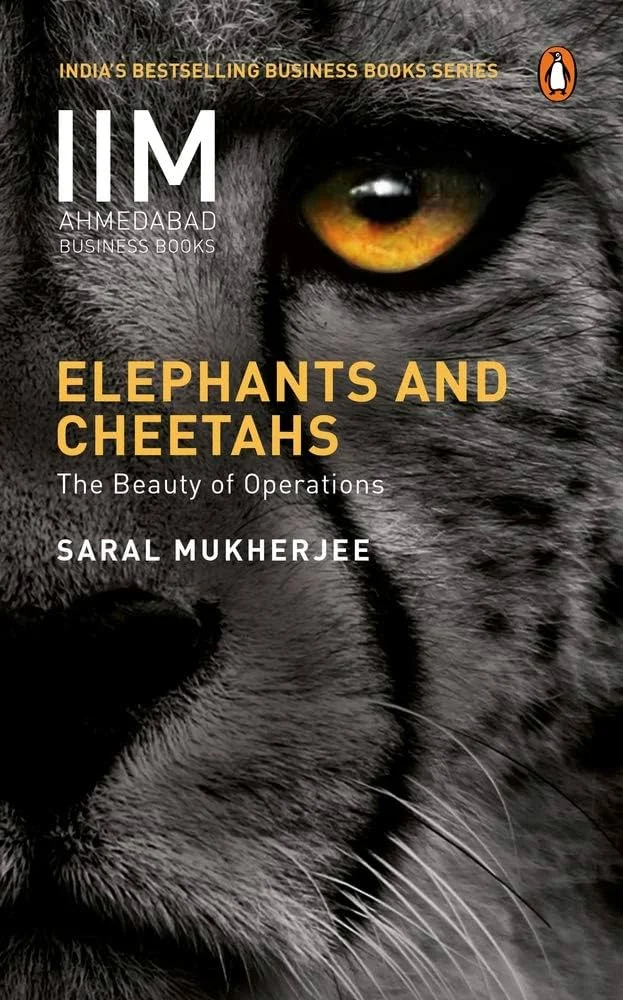Mr. Rishabh Bhatia, IOCL
rishbhatia@indianoil.in

“Elephants and Cheetahs: The Beauty of Operations,” written by the esteemed Prof. Saral Mukherjee, presents a refreshing perspective on operations strategy through the lens of nature’s metaphors. This unique and insightful book delves into the captivating world of strategic choices, skilfully revealing their inherent allure and their profound impact on the essence of organizations. With a deep admiration for the diverse qualities that shape business models, Prof. Mukherjee offers an enlightening exploration of operations from a fresh and engaging perspective.
One of the notable aspects of this book is the endeavour to infuse aesthetics into a field often perceived as dry and quantification-focused. By drawing parallels between operations systems and elements from nature, literature, and arts, Prof. Mukherjee brings a refreshing perspective to the subject. He delves deep into case studies, identifying core issues that run through organizations, and seeks meaning within seemingly mundane aspects of existence.
Prof. Mukherjee’s expertise in operations shines through as he explores the intricacies of business models and strategies. The book introduces the concept that organizations possess a soul—a greater system that transcends the sum of its parts. Through flawless interaction and inherent complexity, this system undergoes transformations influenced by various constraints. The author challenges conventional operations managers to consider the possibility that organizations can have a purpose beyond profitability and shareholder satisfaction.
Prof. Saral Mukherjee presents strategy as the art of closing doors and embracing self-imposed constraints. He argues that organizations, like individuals, must make conscious choices due to limited resources. By reflecting on the existential aspects of business, the book prompts top management to contemplate essential questions related to identity, purpose, customer service, value creation, differentiation, and shareholder value.
The book is divided into four parts, each providing valuable insights. Part I explores the idea of operations systems with souls and how constraints contribute to their complexity. Part II delves into understanding a firm’s strategy and its impact on transformations, interactions, and organizational culture. Part III characterises the elephants (representing cost leadership) and the cheetahs (symbolizing time responsiveness) while addressing critical aspects like cost-cutting, design, quality, flexibility, and risk minimization. The last part glorifies the beauty of operations way beyond the realm of rolling up the sleeves and getting hands dirty in quest to bring somethings into existence.
Author’s metaphorical exploration expands beyond elephants and cheetahs, encompassing a wide range of animals such as turtles and leeches. He highlights the presence of smaller, insect-like firms that compete through cost-cutting measures and operate with minimal fixed costs. These firms prioritize serving customers inexpensively without aiming for significant growth, emphasizing contentment as a shared philosophy within their ranks.
The book also includes captivating case analysis of McDonald’s Corporation, ZARA: Fast Fashion & Jiro Dreams of Sushi, as Appendix. These case analysis offer a practical illustration of the issues discussed in the book and enhance the readers’ comprehension beyond theoretical concepts.
Recognized as one of IIMA’s most awarded professors and a recipient of the Marti Mannariah Gurunath Outstanding Teacher Award, Prof. Mukherjee effectively conveys the importance of understanding operations management for effective organizational management and encourages readers to think deeply and prompts business leaders to contemplate existential questions while encouraging them to embark on a transformative journey of self-reflection. This thought-provoking book is a must-read for anyone seeking a fresh and inspiring perspective on the world of operations.
Posted in Book Reviews | No Comments »
Recent Articles
- Hit Refresh: The Quest to Rediscover Microsoft’s Soul and Imagine a Better Future for Everyone by Satya Nadella
- ‘Range – How Generalists Triumph in a Specialized World’ by David Epstein
- Handbook of Sustainable Development
- Into the heart of Himalayas
- The Millennials: Exploring the World of the Largest Living Generation
- Systemic Coaching & Constellations
- Beyond Talent
- Practicing the Power of NOW
- Elephants and Cheetahs: The Beauty of Operations